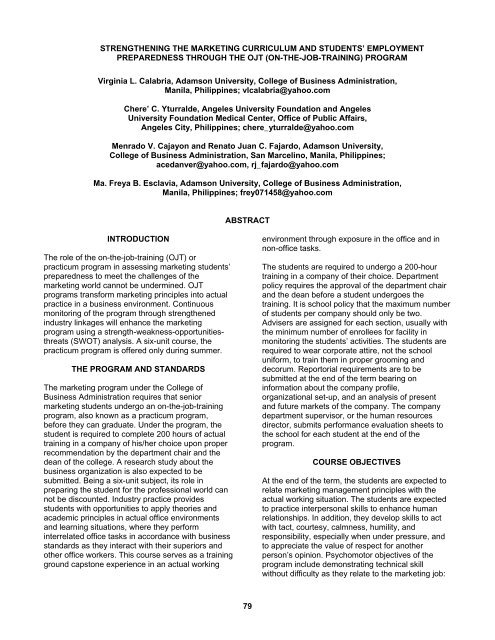2008 - Marketing Educators' Association
2008 - Marketing Educators' Association
2008 - Marketing Educators' Association
Create successful ePaper yourself
Turn your PDF publications into a flip-book with our unique Google optimized e-Paper software.
STRENGTHENING THE MARKETING CURRICULUM AND STUDENTS’ EMPLOYMENT<br />
PREPAREDNESS THROUGH THE OJT (ON-THE-JOB-TRAINING) PROGRAM<br />
Virginia L. Calabria, Adamson University, College of Business Administration,<br />
Manila, Philippines; vlcalabria@yahoo.com<br />
Chere’ C. Yturralde, Angeles University Foundation and Angeles<br />
University Foundation Medical Center, Office of Public Affairs,<br />
Angeles City, Philippines; chere_yturralde@yahoo.com<br />
Menrado V. Cajayon and Renato Juan C. Fajardo, Adamson University,<br />
College of Business Administration, San Marcelino, Manila, Philippines;<br />
acedanver@yahoo.com, rj_fajardo@yahoo.com<br />
Ma. Freya B. Esclavia, Adamson University, College of Business Administration,<br />
Manila, Philippines; frey071458@yahoo.com<br />
INTRODUCTION<br />
The role of the on-the-job-training (OJT) or<br />
practicum program in assessing marketing students’<br />
preparedness to meet the challenges of the<br />
marketing world cannot be undermined. OJT<br />
programs transform marketing principles into actual<br />
practice in a business environment. Continuous<br />
monitoring of the program through strengthened<br />
industry linkages will enhance the marketing<br />
program using a strength-weakness-opportunitiesthreats<br />
(SWOT) analysis. A six-unit course, the<br />
practicum program is offered only during summer.<br />
THE PROGRAM AND STANDARDS<br />
The marketing program under the College of<br />
Business Administration requires that senior<br />
marketing students undergo an on-the-job-training<br />
program, also known as a practicum program,<br />
before they can graduate. Under the program, the<br />
student is required to complete 200 hours of actual<br />
training in a company of his/her choice upon proper<br />
recommendation by the department chair and the<br />
dean of the college. A research study about the<br />
business organization is also expected to be<br />
submitted. Being a six-unit subject, its role in<br />
preparing the student for the professional world can<br />
not be discounted. Industry practice provides<br />
students with opportunities to apply theories and<br />
academic principles in actual office environments<br />
and learning situations, where they perform<br />
interrelated office tasks in accordance with business<br />
standards as they interact with their superiors and<br />
other office workers. This course serves as a training<br />
ground capstone experience in an actual working<br />
ABSTRACT<br />
79<br />
environment through exposure in the office and in<br />
non-office tasks.<br />
The students are required to undergo a 200-hour<br />
training in a company of their choice. Department<br />
policy requires the approval of the department chair<br />
and the dean before a student undergoes the<br />
training. It is school policy that the maximum number<br />
of students per company should only be two.<br />
Advisers are assigned for each section, usually with<br />
the minimum number of enrollees for facility in<br />
monitoring the students’ activities. The students are<br />
required to wear corporate attire, not the school<br />
uniform, to train them in proper grooming and<br />
decorum. Reportorial requirements are to be<br />
submitted at the end of the term bearing on<br />
information about the company profile,<br />
organizational set-up, and an analysis of present<br />
and future markets of the company. The company<br />
department supervisor, or the human resources<br />
director, submits performance evaluation sheets to<br />
the school for each student at the end of the<br />
program.<br />
COURSE OBJECTIVES<br />
At the end of the term, the students are expected to<br />
relate marketing management principles with the<br />
actual working situation. The students are expected<br />
to practice interpersonal skills to enhance human<br />
relationships. In addition, they develop skills to act<br />
with tact, courtesy, calmness, humility, and<br />
responsibility, especially when under pressure, and<br />
to appreciate the value of respect for another<br />
person’s opinion. Psychomotor objectives of the<br />
program include demonstrating technical skill<br />
without difficulty as they relate to the marketing job:


